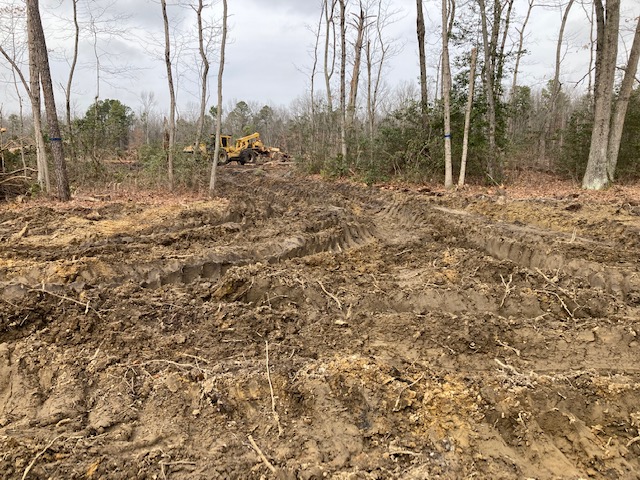Last updated/Reviewed on June 18, 2025
Overview
In early 2023, the New Jersey Division of Fish and Wildlife destroyed 19 acres of mature forest and wetlands in the Glassboro Wildlife Management Area to create habitat for the American woodcock—a game species of low conservation concern. This project, involving stump removal and soil disturbance, violated basic conservation standards and bypassed proper permitting and public review. Rare plants, ancient soils, and wetlands were damaged without oversight or sediment control. NJDEP took regulatory action against its own division, halted destructive activity, and committed to remediation and improved oversight.
Current status
Restoration has been underway following a cookie-cutter approach that did not incorporate the suggestions of The Alliance and the New Jersey Conservation Foundation. Experts on the area report that the 2024-2025 drought conditions have taken their toll and the restoration is not going well.
background information
New Jersey’s Wildlife Management Area system preserves an array of fish and wildlife habitats throughout the state. Glassboro Wildlife Management Area is located off Fries Mill Road in Clayton NJ (Gloucester County).
In early February 2023, nineteen acres of mature oak forests in Glassboro Wildlife Management Area (WMA) were destroyed by the state in order to create habitat for the American woodcock. The majority of destruction occurred in wetlands and wetlands transition areas that are supposed to be protected from this kind of activity. This included mature shortleaf pines and swamp chestnut oaks, as well as two rare plant populations.

‘Forestry’ is generally defined as the science or practice of planting, managing, and caring for forests. In New Jersey, this term is widely applied to label many destructive activities—including clear-cutting—as permissible ‘forestry’ practices; however, what transpired in Glassboro is too extreme to qualify for even this overly-generously categorization. This was land conversion, because the stumps were removed and the pristine, ancient soils beneath were bulldozed. If proper procedures had been followed, this never could have received a forestry plan approval or have obtained a general permit for wetland habitat restoration.
Mature forest was being converted to grassland to create habitat for the American Woodcock— this is a species of “low conservation concern”, so the goal of this habitat-creation was simply to create more game-hunting grounds. For this additional recreation opportunity, New Jersey has paid a steep price—both ecologically, and financially.
New Jersey Department of Environmental Protection (NJDEP) staff initially wrote off the concerns of conservation groups, describing the destruction as the “restoration and expansion of previously existing fields targeted for meadow/pollinator mix and scrub/shrub habitat.” They justified their actions as being “well vetted through our internal review process (LMR) and Jason Hearon and staff coordinated the project in close coordination with the Forest Service.” NJDEP staff have started to shift their position on this issue, informally acknowledging that mistakes were made; we are still waiting for an official statement and formal investigation of the matter.


The damage has been done, but we can make sure that this can’t happen again. We intend to hold NJDEP accountable, and to get relevant legislation and rules passed. This blunder comes on the heels of a forestry task force report that called for greater accountability for all forestry plans. This project should have been subjected to a 14-step public review process. If given the opportunity, local experts could have suggested more suitable plots of land for Woodcock habitat-creation that would not have required the destruction of wetlands. It is essential that the recommendations of the forestry task force be codified through legislation. Furthermore, it is important that these laws and subsequent rules be authored by a science commission with deep knowledge of the underlying science.
Timeline
February 2023 (exact start date unknown): NJDEP Division of Fish and Wildlife begins an unlawful land conversation project, skipping the public 14-step process that NJ law requires to solicit public feedback before undertaking any such projects on public land.
March 6, 2023: Conservation organizations (the New Jersey Conservation Foundation, Pinelands Alliance, South Jersey Land and Water Trust, and Citizens United to Protect the Maurice River) sent a letter to NJDEP leaders and Senator Bob Smith to alert them to the problem. Read the letter online.
March 10, 2023: NJDEP suspended this project.
April 6, 2023: NJDEP’s Bureau of Coastal and Land Use Compliance and Enforcement issued a notice of violation to the NJ DEP’s Division of Fish and Wildlife
Spring 2023: The initial violation was covered by the following news outlets:
- The Philadelphia Inquirer on 4/14/2023.
- NJ.com on 3/16/2023.
- The New York Post on 3/15/2024.
- The Associated Press on 4/14/2023.
December 20, 2023: NJDEP announced the proposal of a restoration plan to address the freshwater wetlands violation (page 4 of this bulletin).
February 16, 2024: 60-day public comment period closes. Read the 2/14/2024 comment letter that Pinelands Alliance and local ecological experts submitted online.
February 24, 2024: Staging observed on the property (potentially present weeks earlier), including a storage trailer, porta potty, fence posts and wire fencing on site.
March 22, 2024: Heavy equipment, pick-up trucks observed working on the site, including a Cat 225 (or similar) operating directly on top of the archaeological dig site that we had warned must be avoided.
March 25, 2024: The Alliance and NJCF send a letter to the NJDEP Commissioner “to express our deep disappointment in the way that the restoration of the Glassboro Wildlife Management Area is being carried out.” Read the full letter online.
